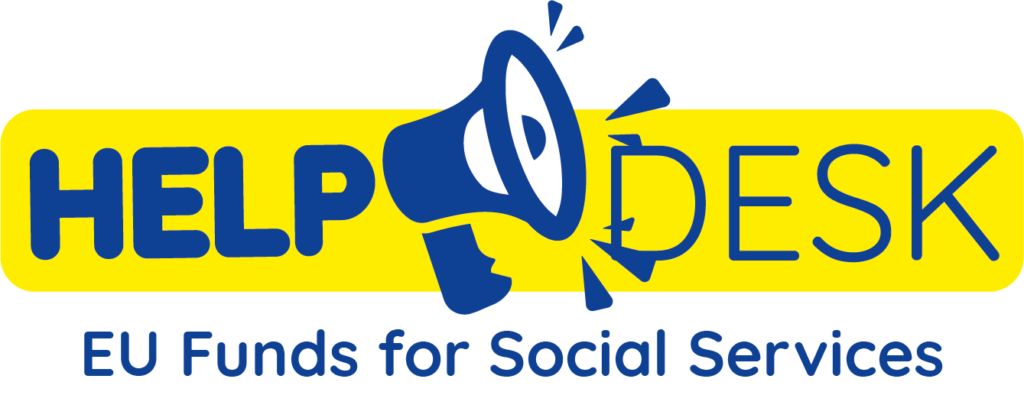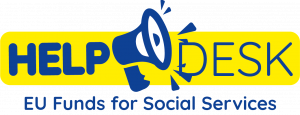“Get acquainted with the MOOC structure and select your learning path.”
Abstract:
The “Social Services – How to successfully fund your EU project” MOOC is a comprehensive training programme offering practical knowledge and skills in EU funding, project planning, proposal writing, financial management, and regulations. Designed for flexibility, it empowers social service professionals to successfully implement EU-funded projects.
Objective:
To create a general training programme (MOOC and a follow-up workshop curriculum) with the purpose of structuring and simplifying information on European funding for social service providers, with a specific focus on access to, use of and reporting on the ESF+, ERDF and other funding. This general training programme will serve as a universal basis to be contextualised at the national level.
Target group:
- top and middle managers in social services, designated social service provider’s staff,
- level of experience with EU funding: none – occasional! (more advanced users might benefit from direct HELPDESK consultations or facilitated exchange of good practice),
- managing authority (MA) staff, including Intermediate Bodies (IBs) – mostly for information.
EDUCATIONAL principles:
Given the geographical and experiential breadth of the target group, the following principles have been proposed to make sure the final format of the training is a useful tool. The users will then be able to pose questions that could further be addressed by the HELPDESK project.
Principles:
- refrain from formality, information repetition (interlink, hyperlink): QUALITY & BREVITY!
- HELP THE PARTICIPANT TO ASK THE RIGHT QUESTIONS at every step of the process!
- give specific and practical EXAMPLES, share GOOD PRACTICES and SUCCESS STORIES!
- facilitate DISCUSSION and INFORMATION EXCHANGE!
Key MOOC themes
The European wide survey amongst the service providers offered insights into some of the key areas / themes that should be addressed across the curriculum:
- finding and understanding project opportunities quickly (eligibility, reflecting the needs, finding partners, guidance),
- developing the project application efficiently and swiftly,
- co-funding and how to secure it,
- efficient communication with the MAs,
- efficient reporting to meet the requirements,
- public procurement rules – basic principles.
Which skills can you expect to learn and develop through this MOOC?
On a basic level this MOOC will help you with or touch upon:
Understanding EU Funding Landscape: A comprehensive understanding of the various EU funding programs, their specific objectives, requirements, and procedures is crucial. Understanding how to navigate these programs, and knowing which ones are the best fit for their organisation is a key skill to develop.
Project Planning and Development: Skills in project planning and development are vital for crafting a successful proposal. This includes identifying needs, setting achievable goals and objectives, planning activities, and creating realistic budgets.
Proposal Writing: Writing clear, concise, and persuasive proposals is a critical skill. This includes clearly articulating the problem, explaining how the project addresses it, demonstrating the project’s expected impact, and justifying the budget.
Budgeting and Financial Management: Understanding how to create a realistic, cost-effective budget and how to manage finances throughout the project’s implementation is essential. This also includes understanding EU rules on eligible and ineligible costs.
Monitoring and Evaluation: Understanding how to set clear indicators, measure progress towards objectives, and evaluate the project’s impact is crucial. This also includes how to use these evaluations to improve future project implementation.
Partnership Building and Management: Many EU funded projects require partnerships. Knowing how to identify potential partners, build effective partnerships, and manage these partnerships throughout the project’s lifespan is a valuable skill.
Understanding EU Regulations and Compliance: Participants should develop a clear understanding of the EU’s regulatory environment, including procurement rules, data protection rules, and rules on transparency and accountability.
Communication and Dissemination: Skills in effectively communicating about the project, both within the organisation and externally, are vital. This includes how to disseminate project results and findings to various stakeholders.
Risk Management: Understanding potential risks, planning for them, and knowing how to mitigate them if they arise is important for successful project implementation.
Sustainability: Understanding how to plan for and achieve project sustainability, both during and after the funding period, is a crucial skill.
How to use the MOOC?
There are several ways you may approach using this MOOC:
- register and progress through the chapters, studying them carefully – this is recommended if you have very little knowledge and sufficient time to dive deep,
- stay anonymous, get an overall notion of the content by watching the INTRO and SUMMARY videos for each chapter and then select specifically the chapters you are interested in.
Feel free to combine the approaches and contact the Helpdesk support team for more suggestions on study methods and approaches.
Types of content:
- text information,
- simple graphical elements,
- video intro explainers,
- video summary explainers.
*Users can activate subtitles and translations in video settings.
Disclaimer
This MOOC uses Artificial Intelligence in order to improve users’ experience. The technology used is a human imitated voice that is represented by the fictive experts George and Anne which read scripts that have been written by the consortium of the project. This AI technology has been developed by Synthesia.io. This course is designed in alignment with the “Ethics guidelines for trustworthy AI” of the European Commission. These guidelines emphasise the importance of fairness, transparency, accountability, and the protection of individual rights when using AI technologies.


